Aerosmith started whatever day Steven walked in the door, says Joe Perry, his Boston accent flattening those r’s into ah’s. As in Steven Ty-lah.
It’s refreshing that after 50 years in one of the most successful bands in history, Perry still sounds like he really doesn’t give a fuck. Like he would be just as content sitting on the beach, reading Lincoln Child novels with his wife Billie (“it gives us something to talk about”) at their new home south of Tampa — as doing the whole guitar-god thing.
His aloofness is either a facade or a defense mechanism he’s adopted to stay sane in a band he once quit for caring about too much (more on that later.) Perry returned to Aerosmith in the ’80s, but by then the MTV music-video era was in full swing. The band never returned to that gritty, blues-rock fare. But with Perry in the band, it felt like the soul of the band was still there, still beating. Even when he was a prancing minotaur in the “Pink” video.
But now, with a procession of 50th anniversaries already underway, the band is ready to return to their classic era of 1971 through 1979. And Perry is thrilled to open up the vault. He says they plan to continue releasing pieces of early, unearthed material in the same vein as 1971: The Road Starts Hear, an early live demo of Aerosmith when they were unsigned and just starting to work out the songs that would become their eponymous 1973 debut.
Requests for Aerosmith to play early material are particularly high, Perry said, for their Deuces Are Wild Las Vegas residency at the Dolby Live at Park MGM. After a two-year hiatus due to the pandemic, America’s greatest rock band will resume the career-spanning residency. It kicks off on June 17 and continues through December 11. Tickets go on sale on March 31 via Ticketmaster.
“We really had to talk Steven out of swinging on a rope out over the audience,” Perry says with a laugh. “But as far as I’m concerned, it’s going to be a rock show.”

What do you do on days off in Vegas?
Joe Perry: We’ve gotten pretty into powered paragliding.
What is that?
When we’re in Vegas, there is this little patch of desert, probably like 10 square miles. It’s really flat. A pickup truck drives around in a huge circle while you’re standing there, [attached to] about 30 or 40 feet of rope, a steel cable, and lifts you up in the air as the truck is driving around about 20 miles an hour. They reel you out until you’re about 3,000 feet or something. And, and then after you’ve been up in the air for a while, they pull this latch and you disconnect. And then you basically parachute down.
That sounds insane.
Steven actually has one of the things you strap on with a propeller on the back. And I’ve seen him fly it himself. We’re not going to be doing parachutes this summer. It’s so easy to break an ankle or something. There’s a point when you’ve got to know [laughs].
How much do you pay attention to your peers who are kind of miraculously still out there. Paul McCartney, Jeff Beck, the Who, the Stones.
I mean, it seems like yesterday I was watching The Who back in 1968. Just for a little perspective on this. I remember it was either ‘68 or ‘69. I was at the Boston Tea Party [a synagogue-turned-rock club], out by the ticket window. Fleetwood Mac was playing. A couple of friends of mine had an extra ticket to see the Stones. They told me ‘this could be the last tour.’ You know with Keith and everything. I said, I think I’m going to stay and watch Fleetwood Mac.
Who, or what band, of that era is the most remarkable to hear live today?
Jeff Beck, for sure. We send texts back and forth once in a while. He’s a very private guy, as I am. And a lot of us are. Anyway, the last time I heard him, he was playing better than ever, which is pretty unbelievable.
Before the pandemic, you had a bad health scare. [Perry collapsed onstage with his other band the Hollywood Vampires, later citing dehydration and exhaustion.] Were you worried you wouldn’t be able to perform after that?
It was really a bummer. I let the guys down. And also my family was there, which is even more important. It woke me up to the fact that I’m not bulletproof. I discovered some physical things that I had to adjust. My mother had cholesterol problems early on. You know, just certain medications I take, and others can’t. I mean, it was definitely a scare. But in my heart — and I’m saying that figuratively [laughs] — I knew I’ll be back on my feet playing.
I wanted to ask you about this early demo you released, The Road Starts Hear. It’s kind of amazing how different the band wound up sounding two years later on the 1973 debut.
This particular recording was from a few months after Brad [Whitford] was in the band and six months before we got signed. It sounds pretty rough, but I’ve always said we’re America’s garage band. And now you have it, warts and all.
What struck you hearing it after all these years?
It has a real primitive nature I find interesting. I can hear all the things that we’ve kind of filled in the blanks on over the years.
This particular tape somebody had found on a [tour] bus that was sitting out in the woods for, I don’t know how many days or years. Then it found its way to the backseat of Steven’s father’s car and then went into a box at Steven’s house where it’s sat for like 20 years.
One of my favorite songs on Aerosmith’s debut is “Movin’ Out.” I didn’t realize it was the first song you and Tyler wrote together. In the first few verses, your guitar and his voice are kind of operating in unison. Like you’re trying to sew them back together.
Like you said, it was our first one. We just didn’t have a plan at that point.
[embedded content][embedded content]
Well, that’s what I’m wondering. When you wrote about hearing Chuck Berry for the first time, you called him your imaginary mentor. That you heard two voices — his singing voice and the voice of his guitar. Back on “Movin Out,” when you were just figuring out how to write together, it sounds like you were trying to replicate that dual sound, but with Tyler’s voice.
That was the template for a long while. Especially earlier, when it was just the two of us going at it. Stephen had written songs before in his other bands, I don’t know how he wrote songs with them. But when we sat there, I’d started playing a riff, and whatever kind of caught his ear, he’d tap out on the drums and we’d just go from there, flesh it out. Record it then listen back and pull riffs out, walk around the yard with headphones on.
Do you remember the last song you and Tyler wrote like that?
No, but there’s one song on Music From Another Dimension! called “Something.” I’d been hanging onto it for 15 years. I said the only way we’re doing with the band is if Steven plays drums on it. I really kind of threw the gauntlet down on that one. But you can hear what I hear on it, how different his drumming style is.
Is that how “Woman of the World” came together on the next album Get Your Wings? I bring it up because the rhythm and the guitar stick out as particularly magnetic.
I would say it probably was. I haven’t listened to the song in a while so I don’t know for sure. On the breakdowns where we could jam a little more, we kind of recorded it so that I could go back in and add a guitar solo and do two or three takes to finish it.
The arrangements on Wings, in my mind, sound lightyears beyond the debut. They’re like mini-operas. How did that work?
We used to argue all the time in a creative way, like, who would do their bit first. I kind of liked doing the guitar part first and then the voice after that. There are arguments for both. So that’s why my riffs kind of fall on the vocals, generally speaking.
[embedded content][embedded content]
Is there an album or song that you look back and hear “okay, that’s where I really became my own musician, I’ve made this sound my own.”
“Toys in the Attic,” probably. [At that time] I felt like we were starting to get comfortable working in the studio, you know, learning the actual technical part of recording music. Then I actually felt like I could play. It was always rough for me. I felt like I struggled for a long time. But once we hit that stride with Toys, then Rocks it was like ‘Phew, we made it through the first year of college without failing out.’ I mean, the record company was pretty much ready to drop us after the first one [Aerosmith] didn’t really make a lot of noise. It was kind of touch-and-go there for a while.
Aerosmith played “Toys” at the 2018 MTV Video Music Awards with Post Malone. A bit of a curveball considering you have so many better-known MTV hits. Has there been more of an effort to highlight, or reintroduce the earlier rock music?
That’s probably one of the biggest ongoing points of contention. Sometimes when we’re playing a deep cut and everybody sits down, some of the guys don’t like it. And my opinion is, well, nobody’s leaving the venue. They’re actually sitting there listening to a song they might not have heard since the last time we played the album. It might have been one of their favorites, but didn’t make the cut as the years went on. Sometimes we’ll play a song from the ’70s and then get questions from people who are hearing us for the first time, like, ‘Where did that come from?’
When we did the Run DMC thing. That was big here [in the U.S.] but when we went to Europe, it was even bigger. A lot of people came up to us and said, ‘Wow, this is great. You guys have anything else like this?’ Thinking this was our first go around. Same thing on Get A Grip — that was the first album so many people heard.
Do you think Aerosmith’s ‘70s albums deserve a re-appraisal?
Definitely.
[embedded content][embedded content]
I’ve always thought, specifically, Draw the Line and Night in the Ruts — the last two albums you made before leaving the band — were so underrated. Overshadowed.
Well, the band was starting to crumble at that point. We had internal problems. I just knew we weren’t giving the audience the 100% that they came to see. There were a lot of things, a lot of reasons why I left.
You’ve said that the tracks you cut for Ruts were some of your personal best. Between the heavy distortion and the Shangri-Las cover, I feel like it would go over well today.
Those songs, I mean, I’m hoping that we can. I’m hoping they get heard again. On those records, I remember, we pretty much played it live and left it that way. Solos, the rough vocal tracks, everything. So that’s one of the reasons I think those songs are [unique].
“The guitar interplay between me and Brad broke new ground. Everyone was at the top of their game. When it came time for lyrics, though, Steven began to drift away … The whole operation had become a nightmare. I was tired of the bullshit. I just wanted to get in a van and go play rock and roll. I was willing to play clubs – any clubs … I was told that when Steven finally did show up to do his vocals he was smoking crack.” — Rocks, 2014.
The whole funk aspect in “Sight for Sore Eyes” that the band had going on. [Pauses] We weren’t really cooperating with our record label or doing what we needed to do to push the record. “Draw The Line” did see the light of day, and we still play that. But I would really love to play a song like “Chiquita.”
Yes. “Chiquita” is such a raw, just powerful song. I’d also vote for “Three Mile Smile.” The guitar riff is so inventive. Insanely good.
The thing is, too, the audiences were changing. [In the early ’80s] Eddie Van Halen single-handedly turned the focus on guitar players from England and the eastern United States, to L.A. Eddie was just a once-in-a-generation musician. He’s known for his guitar but he was equally comfortable playing the keyboards. He was a genius.
I remember I was at one of my last rehearsals with Aerosmith when I heard the first Van Halen record, and it just blew me away. The only other record I ever felt that way about was the first Guns N’ Roses record. They basically took the best of what had gone on for 20 years and made it their own. I mean, goddamn.
[embedded content][embedded content]
If there’s no pressure of getting a chart hit, why doesn’t Aerosmith just make another hard rock record?
I mean, do I really need to write another “Draw The Line” when there are probably three different versions of that song we have that for some reason we didn’t use? Just knowing what it takes to make [that kind of] Aerosmith record — Steven playing the drums, having a microphone recording all the time and us jamming. I don’t know.
Fair enough. Since you brought up “Sight For Sore Eyes,” which you wrote with the New York Dolls’ David Johansen. Is this the year they finally get into the Rock & Roll Hall of Fame?
David Johansen is still one of my best friends and I love the New York Dolls. I told him that I’d vote 25 times for him if I could. But then, of course, that’s the American way these days.
Now that’s a quote.
There’s a question you haven’t asked me, and that is, what have I been doing for the last two years?
I just assumed you were off riding your Friesian horses.
No, [Laughs], that was years ago. We moved down to Florida. Billy has family down here. When I was young, I’d visit my grandparents here. We’ve always been comfortable here. And right around the time the pandemic started, Billie’s mom passed. It was a really hard time for us.
I’m so sorry.
I mean, we couldn’t even have a funeral at the time. Anyway, it was a hard time. But thank you.
You’ve said that your childhood dream was actually to be a marine biologist. Your parents would drive you into Boston to hear lectures by Jacques Cousteau. Do you get out on the water at all down there? Do you dive or snorkel?
You really hit a spot there. I’ve always loved [diving]. Me and Billie haven’t gotten to it here [in Florida] yet, but we have a shortlist of places we want to go. I have to say, I was thinking about maybe doing one more run [with Aerosmith] and then taking six months and diving in some of these places that I’ve never been to. I kind of doubt that’s going to happen.
But yes, if my life wasn’t captured by the whole dream of rock and roll, I definitely would be spending it on the water.
Where else have you gone diving?
We’ve had a few close calls over the years. One time [in Cuba,] Billie and I were at a spot way past La Reina. The tide went out, and there was nothing but lava rocks. So trying to come in was really, really scary. We had to take our gear off [in the water]. The water was also getting really cloudy and it was getting later in the day. And that when the sharks come out. Not a comfortable time.
It was wonderful the last time [Billie and I] were diving with Steven in Hawaii. Steven and I were down like 110 feet. It was the first real wreck dive that I’d ever done. A lot of fun. Steven and I have had a lot of adventures over the years, and not just diving.



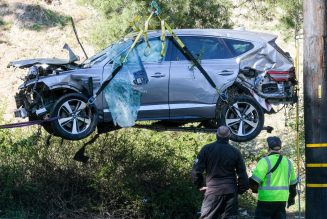
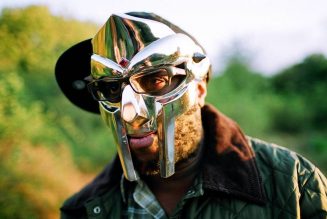
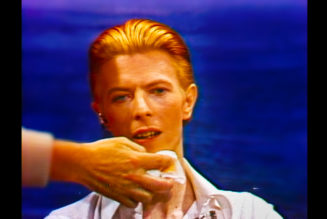
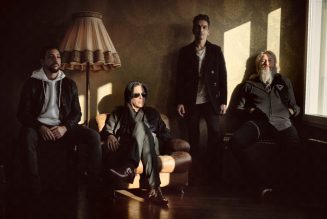
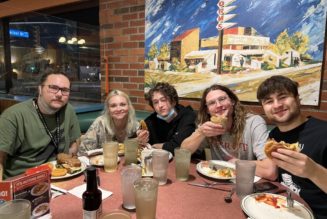

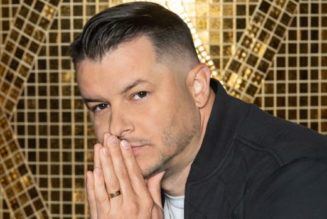

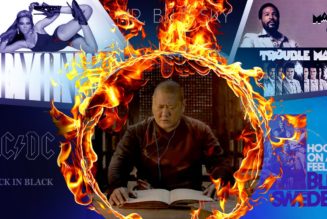
Tagged: aerosmith, FEATURES, INTERVIEWS, joe perry